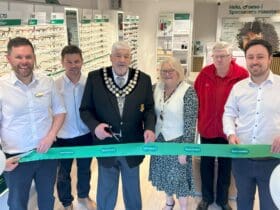A Gwynedd care homes owner says she has seen bills rocket by over £7,000 a week during the coronavirus pandemic.
Ceri Roberts, Managing Director of Cariad Care Homes which runs two homes in Porthmadog and Criccieth, said it was costing over £100 extra per person a week to keep each of her 78 residents safe.
Ceri, a Council member of Care Forum Wales which represents over 450 private care providers across Wales, said: “The Welsh Health Minister, Vaughan Gething, has said there’s over £40 million in the pot for social care but we don’t know how or when we are going to get it.
“I’ve written to Gwynedd County Council three times and have had a phone call back saying they don’t know how much money they’re going to get or how they’re supposed to allocate it.
“It is costing up to £100 a week for each resident because I’ve had to try and find PPE – Personal Protective Equipment – and that is costing a lot more than it used to, if you can get it.
“We hardly used to use masks and they used to cost pennies but now I’ve been quoted £1.82 per mask by one company and I’m actually paying £70 for packs of 50.
“We’ve also had to buy Z beds, mattresses and bedding for staff in case they have to move in to look after our residents.
“The staff have been brilliant and one of the reasons I contacted the Council was because I wanted to be able to reward them for their dedication because they’re petrified and yet they’re still coming to work.
“At the same time they’re seeing lots of their friends being furloughed on 80 per cent wages and that 80 per cent may be more than they’re getting for working on the front line of this pandemic.
“We need to see that money so we can reward our team now but I think it will be a few weeks before local authorities get their act together with distributing it.”
Cariad Care Homes had faced a struggle to order PPE after two of their regular suppliers refused to supply them – because they are in Wales.
Now Ceri has come up with a solution by finding an unlikely source of supply for aprons. She has placed a mass order with a Somerset manufacturer of upmarket shopping bags whose clients include The Rolling Stones and the England rugby team.
Ceri feared she would be forced to issue her staff at the Bodawen home in Porthmadog and Plasgwyn in Criccieth, with bin bags for aprons after being blocked from buying vital protective equipment by Public Health England when their two major suppliers of PPE told them they were only allowed to deliver to care homes in England.
But after an exhaustive worldwide search for a supplier she landed a deal with Bridgwater-based Creatapack who are shipping a first consignment of 12,500 aprons to her.
She said: “For the past week I’ve been constantly on the phone to over 50 different suppliers in China, Europe and the UK to try and get aprons and I finally managed to find this company in Somerset which makes plastic carrier bags.
“They have converted some of their machinery to make plastic aprons and are now turning out 100,000 aprons a day and they have no problem supplying a Welsh care home company.”
Creatapack have converted four bag machines and bought in a die-cutter to cut the patterns for aprons and their production line is running 24/7 and churning out 100,000 aprons a day.
The company makes plastic bags for a range of high end clients including The Rolling Stones, the England rugby team, the London Marathon, Nikon and Sky Sports as well as bags made from paper and even sugar cane fibre.
Ceri said: “It’s a massive relief to know that I have secured a supply and that I don’t have to worry about that at the moment.
“It comes at a cost though as they are more than three times as expensive – we were paying £18 for a thousand aprons and now it’s £83 a thousand.
“They’re a lot more expensive but they’re also better quality and it’s one less headache that I’ve got to deal with.
“We get through 4,000 aprons a week and we couldn’t manage but finding a few hundred here and a thousand there.
“I couldn’t believe it that one part of the UK was being prioritised over the rest – are masks and aprons only for care staff in England?
“I was just dumbfounded to be told that our usual suppliers wouldn’t sell to care providers in Wales, and Scotland.
“These are frightening times and my team are doing everything they can to keep the virus at bay because we know if it does get in it will have disastrous consequences.
“No matter how good your infection control is, if it gets in it will be catastrophic because of the vulnerability of the people we are looking after.
“That’s why I am supporting the campaign launched by Care Forum Wales to shield social care and save lives.”
Mario Kreft MBE, the chair of Care Forum Wales, said the plight of Cariad’s two care homes was all too familiar.
He said: “The shortage of PPE has been a constant and worrying theme every since the coronavirus started spreading at such an alarming pace.
“The other huge worry is that costs, both for PPE and staff wages, are going through the roof.
“The sector was already chronically underfunded because of woefully inadequate fees which were not designed to meet the unprecedented challenges cause by this pandemic.
“The recently announced £40 million aid package announced by the Welsh Government is not going to solve the problems unless it is just a first instalment.
“My other concern is that it is being left to local councils to deliver and I have no confidence that it will all reach the frontline where it is desperately needed.
“Many care homes are on the brink financially and are facing a threat to their very existence.
“Without sufficient support we are facing the prospect of mass care home closures which would be an even worse disaster, both in terms of dealing with the current crisis and in the longer term.
“Each of these homes is a hugely important community asset which helps underpin and support the NHS but once they are gone, they are gone for ever. They are irreplaceable.”









Leave a Reply
View Comments